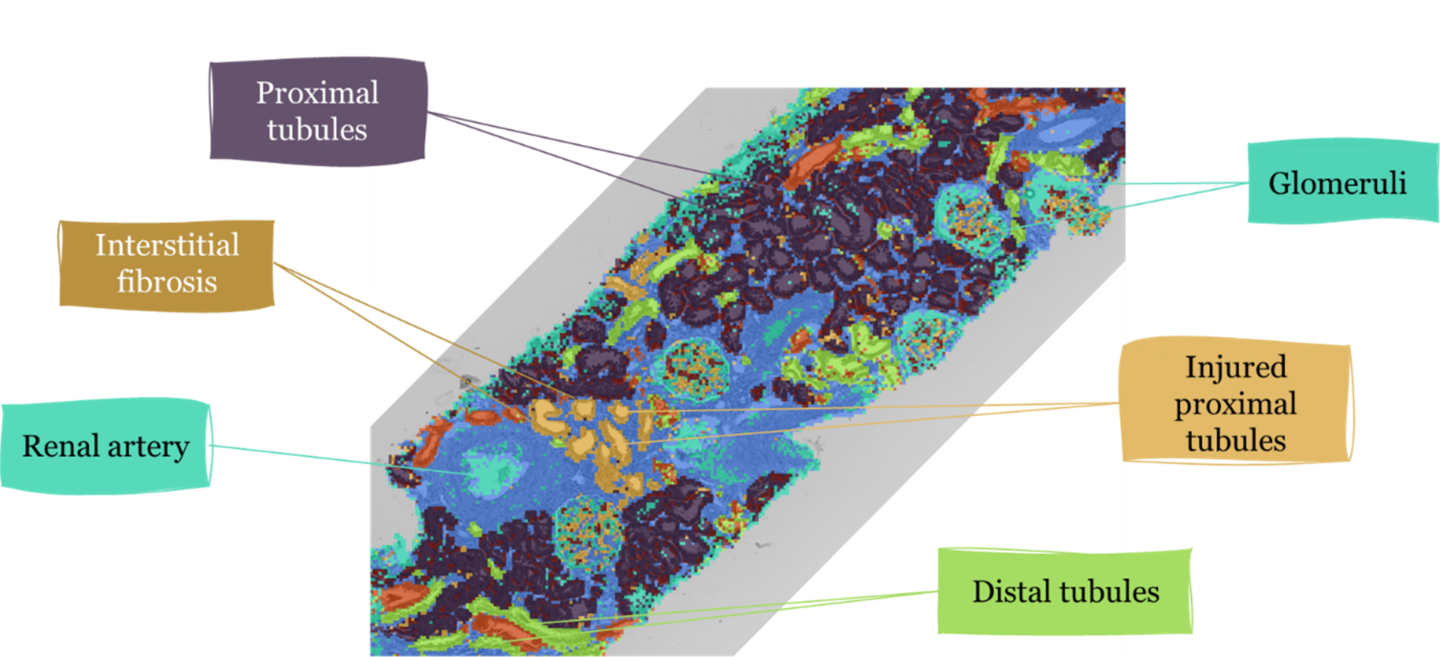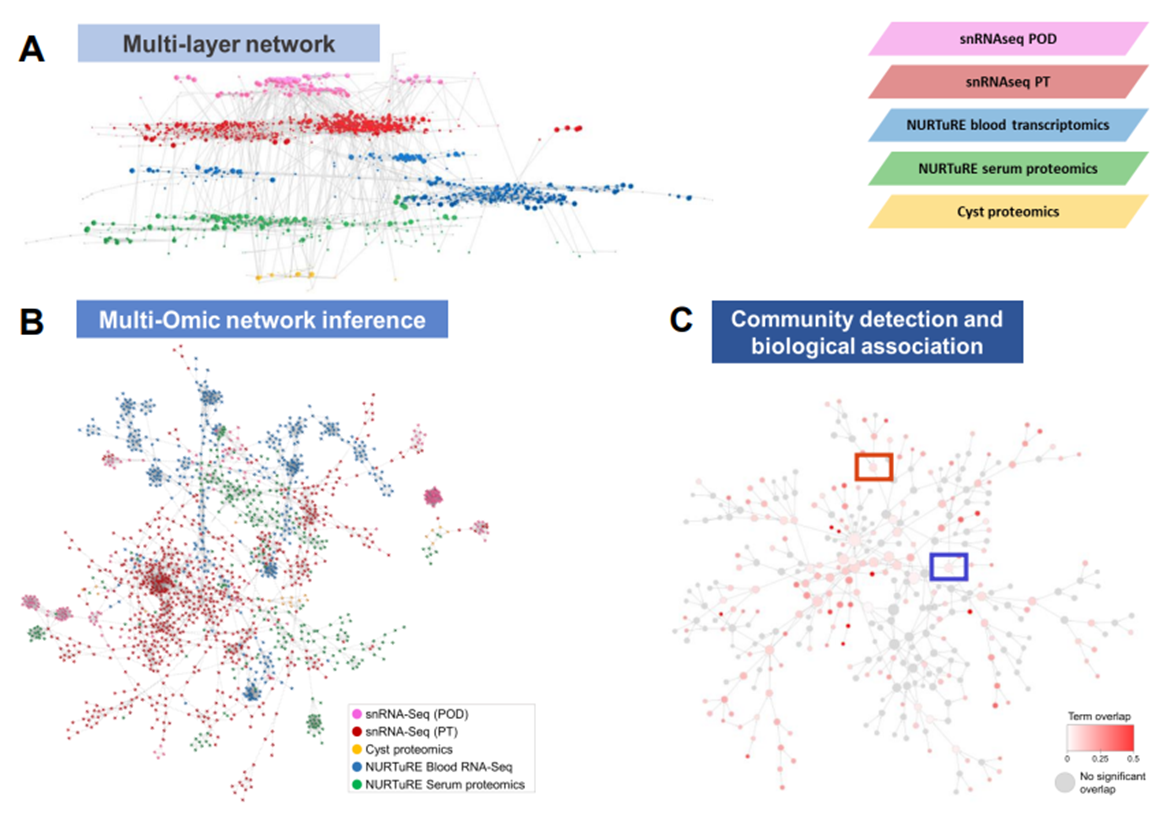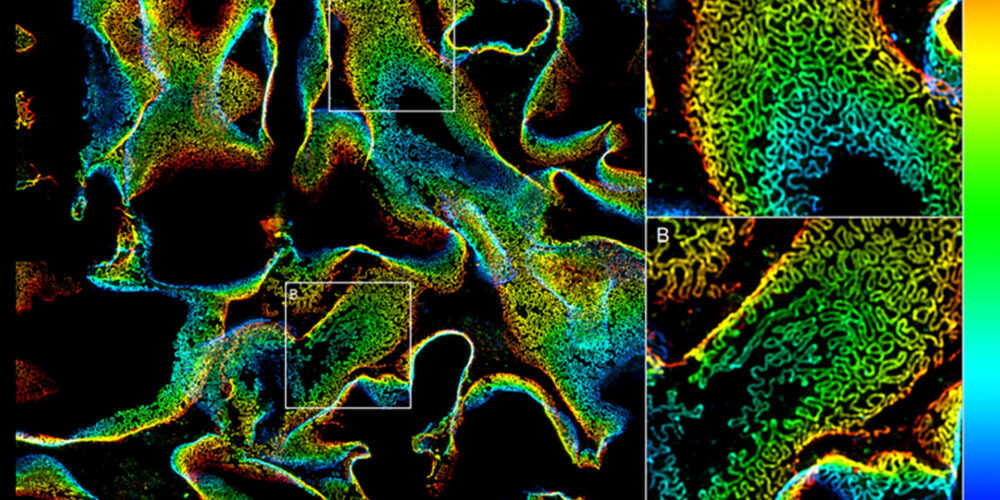Chronic kidney disease (CKD) affects 835 million people globally. CKD is ranked at the 12th position in overall causes of death from non-infectious diseases. Despite recent advances, it is poised to rise to the 5th position in the coming years (Kovesdy, 2022). Clinical successes seen with GLP1 RA, SGLT2i and the ns-MRA finerenone, merely bring the total treatment options to just 5 drug classes. Leaving significant unmet medical needs and a unique opportunity to make a difference in a developing area of pharmaceutical research.
We established robust and comprehensive discovery platforms for:
- Chronic kidney diseases: Diabetic kidney disease, glomerulonephritis, tubulointerstitial nephritis, immune-driven renal diseases etc
- Rare kidney diseases: ADPKD, Lupus Nephritis, ANCA Vasculitis etc
- Acute kidney Injury
Our Renal Team is constituted by biopharma experts with long-term experience in drug discovery and a passion for understanding diseases mechanisms at a molecular level. Our cutting edge technologies and platforms allow us to translate this expertise into effective precision medicines.
*imaged/acquired by NIPOKA (GmbH)
A Network of Molecular Resources for Renal Research
Evotec has over 20 years of expertise in drug discovery for metabolic and renal diseases. Our team of expert kidney biologists has developed a sophisticated panel of in vivo and in vitro resources that enabled over 100 renal diseases projects to date. Most recently, we have assembled a unique biorepository of kidney, blood and biofluid samples within a new molecular patient database (E.MPD). This unique collection of detailed biomedical and molecular profiles includes data on more than 10,000 Chronic kidney diseases patients. Our kidney biologists and drug discovery experts constantly leverage the latest high-definition PanOmics capabilities and have applied them to build a complete catalogue of molecularly defined in vitro cell systems, in vivo disease models that complement ideally the molecular kidney patient data.

Chronic kidney disease patient biopsy (FSGS) analyzed by next-generation spatial transcriptomics using HD Visium TM (10X Genomics). Cortical microdomains identified by their RNAseq molecular signatures. With 8µm resolution, the definition of HD Visium closes down to single-cell scale.
The Renal Assays Platform: in vitro & iPSC-derived
Our high-throughput bioassay platforms recapitulate the complex biology and unique cellular diversity which are typical of renal tissues. To cite just a few, the renal platform offers podocytes, mesangial cells, glomerular endothelial cells, tubular epithelial cells and renal fibroblasts assays associated with a large panel of physiological readouts.
Our biologists also developed and validated human iPSC-derived renal 2D and 3D systems for translational research or high-throughput screening.
By integrating E.MPD data with extended PanOmics resources and AI-driven analyses, our team routinely supports new targets or markers identification and supports project progression with all known therapeutic modalities.
Availability of Unique MultiOmics Datasets for Kidney Diseases R&D
Our disease experts support early-to-late stages drug discovery with:
- Identification of molecular markers of disease progression and treatment intervention
- Selection of specific responder populations and indications using molecular signatures
- Patient data driven target identification
Supporting evidence can be directly sourced in our exclusive multiomics datasets originating from patients tissues and biofluids. Clinically relevant genes and pathways can be identified to specifically support progression of candidate targets or modalities for rare, as well as large indications of kidney diseases. Our global success results from the collaborative work between disease experts, biologists and bioinformaticians, working alongside safety, chemistry, DMPK and preclinical development teams in an integrated drug discovery value chain. Together, we derisk translational cascades and the progression of preclinical candidates towards successful clinical candidates across multiple indications. Our success stories are periodically reported in high-level publications and international conferences (American Society for Nephrology, European Renal Association).
In summary, in vitro and in vivo translational assays together with analyses of PanOmics data from renal patients help derisking preclinical development and improve the probability of success in the clinics.

Example of MultiOmic integration workflow. A. Multilayered network generated from proprietary and public omic datasets. B. MultiOmic network inferred from the graph embeddings from (A). C. Community detection of the nodes contained in (B) each node represents a group of features. Groups with a significant enrichment for biological pathways are colored in shades of red. Two such groups are highlighted in boxes and provided as example, in red “specific granule lumen” and in blue “integrin cell surface interactions”. POD = podocytes, PT = proximal tubules.
Learn More About Our iPSC Kidney Organoids & Assay Systems
- Evotec 3D iPSC Models Drug Discovery Update >
- Kidney Disease 2.0 Drug Discovery Update >
- NEPLEX "Nephron-on-a-Chip" Device | Learn More >
in vivo Platform for Kidney & Metabolic Diseases
Our in vivo platform offers a wide variety of established and validated models in the area of acute and chronic kidney diseases:
Surgically Induced Models
- UUO: unilateral uretheral obstruction
- Uni- or bi-lateral IRI: ischemic-reperfusion injury
Models of Diabetic Kidney Disease
- db/db uNx renin AAV
- ZSF1
In full compliance with our animal welfare AALAC accreditation, our in vivo team meets the highest standards of quality and technical expertise. We feature a large set of preclinical readouts directly relevant for Renal & Metabolic diseases. Typical offerings include readouts of kidney function, mechanisms of action, histopathology, molecular profiling and immune cell infiltration.
Learn More About Our Strategic Alliance Success Stories in Kidney Disease
- Patients With Immunoglobulin A Nephropathy Show Abnormal Frequencies of B Cell Subsets, Unconventional T Cells, and High Levels of Galactose-Deficient IgA1–Coated Gut Bacteria >
- Evotec and Bayer Strategic Alliance: From Target ID to Ph1 Clinical Trial | Learn More >
- Evotec and Vifor Pharma Join Venture in Kidney Diseases | Learn More >
- Evotec and Novo Nordisk For Strategic Alliance for Kidney Diseases | Learn More >
- Evotec and Chinook For Strategic Alliance For Chronic Kidney Diseases | Learn More >
- Evotec and Eli Lilly Form Strategic Alliance in Kidney and Metabolic Diseases | Learn More >

